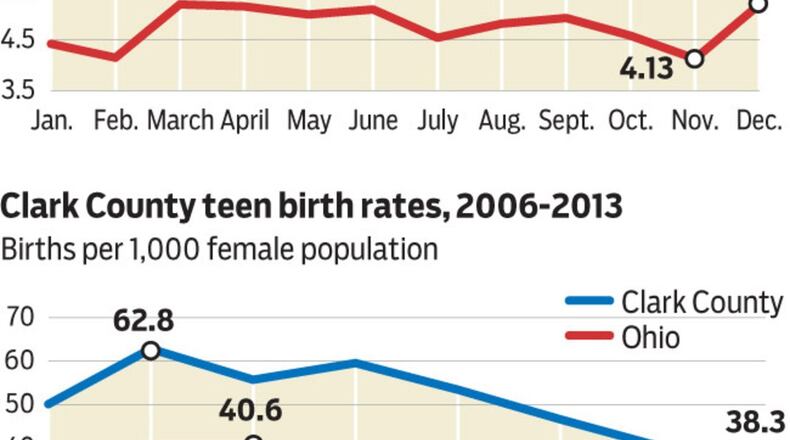More than 120 babies have been born to teen moms during each April between 2008 and 2014, according to statistics from the health district.
“This is definitely an outlier here. This is what we would call a statistically significant difference and basically what that means is that it is not due to chance. There is something going on. Something is contributing to this high number,” said Clark County Combined Health District Epidemiologist Gabe Jones.
Fair board officials said the fair isn’t the cause of this perennial problem, however, and denied the health district’s request.
“The board is uncomfortable providing that service … There are only eight days of the fair. There are 31 days in July. The fair is not the issue,” Fair Director Allan Hess said.
Clark County health officials can’t isolate why there’s a spike in teen conceptions in July, but Health Commissioner Charles Patterson said the jump could be due in part to teens having more free time and less supervision while out of school for summer break and because many teens stay overnights at the fair.
Patterson and other health officials say something needs to be done locally to reduce teen pregnancies, which put teens and their children at greater risk of poverty and serious health conditions.
Planned Parenthood in previous years had a booth at the fair, but hasn’t offered information there since 1998.
The health district now plans to offer information in the Mercantile building to educate parents and youth about teen pregnancy.
The issue of teen pregnancy is a result of kids being out of school for the summer, not the fair, Hess said.
Nationwide, teen pregnancies reached a historic low last year when the number of teen births dropped to about 274,600, down 10 percent from 2012 and the lowest number of teen births ever reported for the United States, according to the National Center for Health Statistics.
In 2013, the number of births was 57 percent fewer than in 1970, the all-time peak year when the number of teen births was more than 644,700, according to NCHS.
Clark County has historically had high teen birth rates, Jones said.
In 2013, the county ranked 10th in the state with a rate of 38.3 teen births per 1,000 births. In 2011, Clark County ranked second in Ohio with a birth rate of 46.6, compared to the state rate at 29.7
Stephanie Ward of Medway agreed that teen pregnancy is an issue in Clark County, but said providing condoms at the fair is absurd and could hurt youth involvement in fair activities.
“I don’t agree with that … They’re not doing anything bad. They’re all good kids,” said Ward, who is an adult parent and was at the fairgrounds on Thursday with her child. “All the health department is going to do is make the problem worse.”
Instead, she said more sex education is needed in schools.
The local teen birth data is concerning, Jones said, because officials are seeing increases in sexually transmitted diseases among youth and because babies born to teen moms have higher infant mortality rates.
The Ohio Department of Health has named three priorities for its health improvement plan, one of which is reducing the state’s infant mortality rate.
Ohio’s infant mortality rate is higher than the national rate and hasn’t declined in the past decade, though the national rate has seen a 12 percent decline from 2005 to 2011, according to ODH.
Clark County health officials want to do everything they can to prevent unwanted pregnancies and teen pregnancies in hopes of eliminating risks of infant mortality, poverty and other risks associated with children born to teens or single parents, Patterson said.
“We know if you’re born to a teen mom and if you’re born into a single parent household, we know in both cases you’re less likely to be healthy, you’re less likely to graduate, you’re less likely to go to college or get a good job and hold that good job and be out of poverty,” Patterson said.
“For every teen birth we prevent, we’re lessening the chances of negative outcomes.”
Susan Bayless, director of nursing at the Clark County Combined Health District, said teen pregnancy is a community-wide problem and health officials need to get the message out to curb teen births.
“It is our responsibility as a health department to protect and prevent if possible (teen pregnancy) any way we can,” Bayless said.
About the Author
